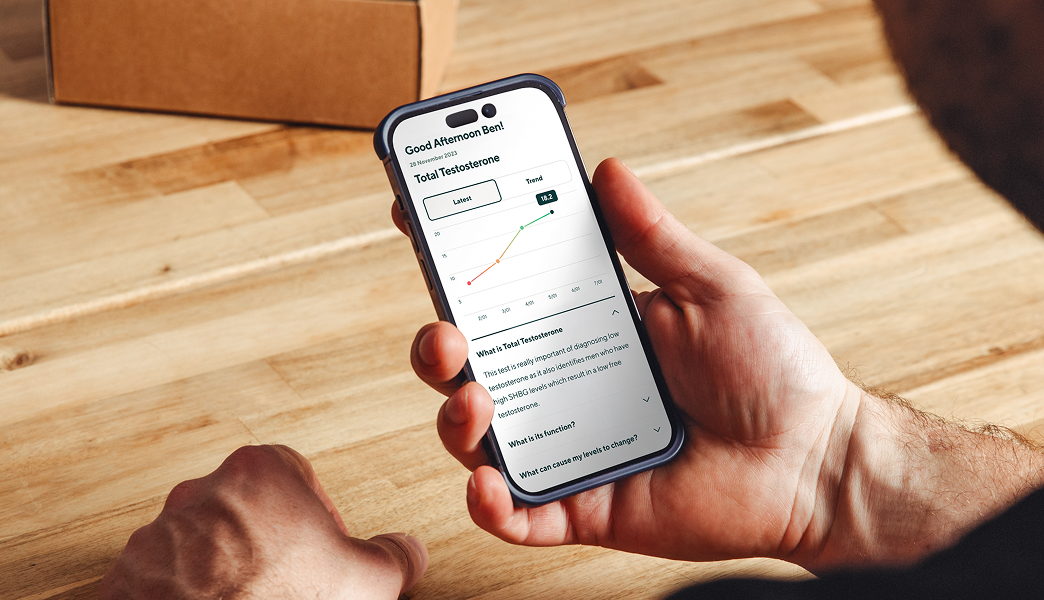Getting treated with MANUAL
We’ve broken down what you can expect on your TRT journey - including the costs - so you can focus on feeling better.
.avif)


Start with a simple at-home finger-prick blood test which measures your total and free testosterone levels. You’ll get your results in 2 to 5 days.




.webp)

A comprehensive venous blood test is needed to confirm the initial result, learn more about your health, and assess whether it’s safe to start treatment.




by BSSM
guidelines to start
TRT

Discuss your blood test results, symptoms, medical history, treatment options (including costs), and monitoring process with an expert TRT doctor.





Your doctor will design a personalised treatment plan that’s tailored to your lifestyle which may include medication, lifestyle advice or supplements. Our monthly subscription includes medication, follow-up reviews with our doctors, doctor’s letters, referrals, and ongoing support from our TRT specialists, plus postage.

unlimited free
doctor support

Regular follow-ups and blood analysis are important because everyone responds to TRT differently. We’ll test your blood at 6 weeks, 3 months, 6 months, and 12 months to allow your doctor to effectively monitor your progress and any side effects, and make any incremental adjustments to your protocol.

Simple steps to treat low testosterone
Simple steps to treat low testosterone
At-home Testosterone test
Start with a simple at-home finger-prick blood test which measures your total and free testosterone levels. You’ll get your results in 2 to 5 days.




Enhanced Testosterone test
A comprehensive venous blood test is needed to confirm the initial result, learn more about your health, and assess whether it’s safe to start treatment.




by BSSM
guidelines to start
TRT
Speak to a specialist Doctor
Discuss your blood test results, symptoms, medical history, treatment options (including costs), and monitoring process with an expert TRT doctor.



.avif)
Start your treatment
Your doctor will design a personalised treatment plan that’s tailored to your lifestyle which may include medication, lifestyle advice or supplements. Our monthly subscription includes medication, monitoring blood tests, follow-up reviews with our doctors, doctor’s letters, referrals, and ongoing support from our TRT specialists, plus postage.
Testosterone monitoring
Regular follow-ups and blood analysis are important because everyone responds to TRT differently. We’ll check-in with you 5 weeks into treatment, also testing your blood (included in your subscription) at 3, 6, and 12 months to allow your doctor to effectively monitor your progress and any side effects, and make any incremental adjustments to your protocol.

Thousands of patients have seen life-changing results




Treatments start from as little as £5/day
Specialist care on your terms











Getting started, frequently asked questions

Our initial at-home finger-prick blood test which measures your total and free testosterone levels costs £33.95. An enhanced venous blood test is then needed to confirm the initial result, learn more about your health, and assess whether it’s safe to start treatment. Our enhanced blood tests start from £49.95.

Starting from £99 per month, our subscription includes medication, follow-up reviews with our doctors, monitoring blood tests doctor’s letters, referrals, and ongoing support from our TRT specialists, plus postage. There are no hidden costs - even medication reviews and replacements for failed blood tests are covered. Injectable treatments start from £99 per month, topical treatments start from £129 per month, and oral treatments start from £99 per month.
No one responds in the same way to the same treatment method, dosing or dosing frequency so it’s essential that treatment is adapted to your unique needs. That’s why regular follow-ups and blood analysis are so important. We’ll check-in with you 5 weeks into treatment, also testing your blood (included in your subscription) at 3 months, 6 months, and 12 months to allow your doctor to effectively monitor your progress and any side effects, and make any incremental adjustments to your protocol. Our monitoring blood tests, priced at £70, are now FREE with your plan.

Undergoing testosterone replacement therapy is completely safe if you’re treated by a specialist doctor who regularly monitors your testosterone levels back to optimal levels.
As with all medications, some people may experience side effects - however, they’re easily controlled and generally avoided with sensible doses and regular monitoring. Some possible minor side effects include fluid retention and acne. More severe potential side effects may include gynecomastia (the growth of male breasts), worsening of existing sleep apnoea, decreased sperm count and an increased number of red blood cells.
Testosterone replacement therapy has an evolving base of knowledge as a cuting-edge therapy in the UK. As such over the last few years some of concerns regarding heart and prostate health are being re-understood. Your TRT doctor will go through this and all your questions in your initial consultation.
We monitor your testosterone levels closely throughout your testosterone journey, so we are best placed to support if any side effects do occur. If you have any concerns or questions, get in touch with our clinicians - it’s free!

Everyone’s medical history is different so our doctor will prescribe a medication that works specifically for you. Successful hormone therapy involves getting just the right dose by the right delivery method for your individual needs. You’ll have the option of taking testosterone medication in the form of injectable, oral, or topical treatments.
Testosterone injections are the most common form of medication as they are convenient and most effective for the majority of men.



.avif)





















































